Khuram Butt: The partygoer who turned into a killer
- Published
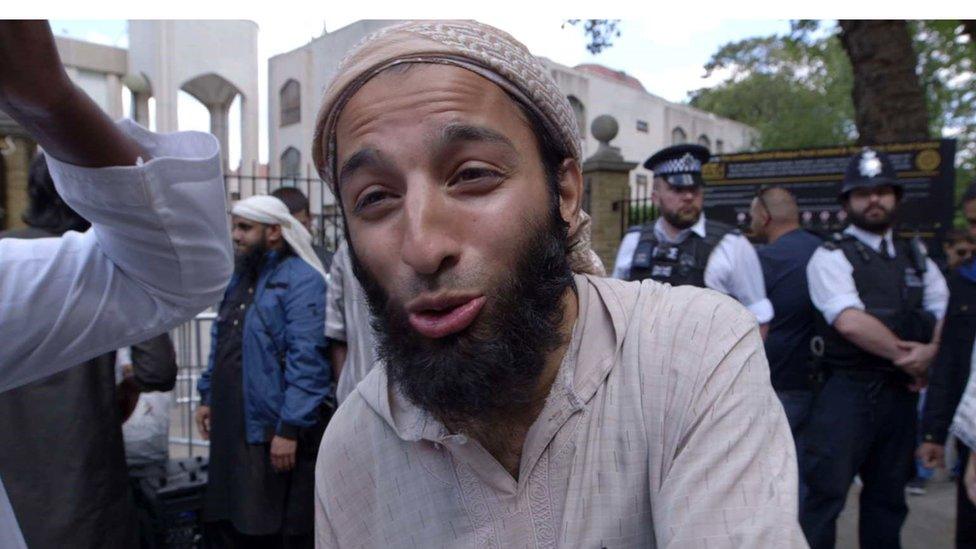
As a teenager, Khuram Butt - the ringleader of the London Bridge terror attack - was a cannabis-smoking "wannabe bad man" who regularly indulged in petty crime.
As an adult, he retained all of those habits - even as he attacked others for being "bad" Muslims.
Those closest to him paint a picture of an easily-influenced man given to obsessions. It was that obsessive nature which led him to Islamic extremism and, ultimately, to murder.
Details of his life emerged during the inquest into those deaths, external. Although coroner Mark Lucraft said none of the members of Butt's family who gave evidence was a "convincing witness", their accounts reveal a controlling man with a history of violence, who lived a life of contradictions.

Born in Jhelum, Pakistan, on 20 April 1990, Khuram Butt had two older siblings, brother Saad and sister Haleema.
His father ran a furniture business and while his family members were practising Muslims, they were not particularly religious.
They arrived in the UK in 1998 on a visitors' visa when Butt was eight.
All three of the children attended schools in Forest Gate and Stratford in east London, with Butt doing well in his end of school exams - he gained 11 GCSEs.
The family attempted to claim asylum, which was initially refused. But in 2004 - following the death of his father from a heart attack - Butt was given indefinite leave to remain in the UK.
He worked as a cashier at a pizza takeaway after school, before getting a job in the stockroom at Topshop on London's Oxford Street.
He received his first police caution at 18 for fraudulently using a friend's payment card on public transport.
From his teenage years Butt went clubbing, smoked drugs, indulged in casual sex and was described as a "wannabe gangster".
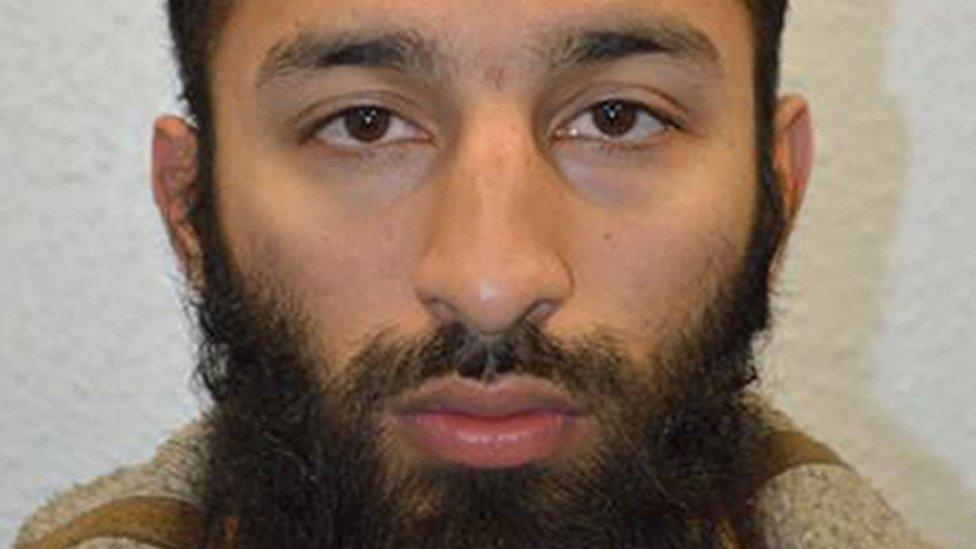
In 2009 he became an office assistant at a removals firm.
But despite being in full-time employment, later working in a number of KFC takeaways, the life of petty crime still appealed.
In December 2010, when he was 20, he received a second caution for common assault occasioning actual bodily harm after a scuffle with a security guard at a shopping centre.
Haleema's wedding
Two year's later, Butt's sister married.
At the wedding he met a man named Hashim Rehman, whose uncle had worked with his father.
Afterwards Butt began to be more observant. He spent time with him, reading Islamic literature and praying five times a day. He also ended a relationship with his then girlfriend because she refused to convert to Islam.
Mr Rehman told police that rediscovering religion changed Butt, initially making him a softer and more humble man. Butt went on to ask Mr Rehman for his sister Zahrah's hand, and they were married on 25 December.
Initially, his newly found fervour for Islam was seen as a good thing. He began staying in and attended his mosque more regularly.
But the inquest heard his religious devotion began tipping into an increasingly extreme version of Islam.
On their wedding day, Butt insisted his new wife should wear a burqa and sat her behind a wooden screen so she could only be seen by him. His brother later took the screen down.
After returning from their honeymoon in Pakistan, Butt moved Ms Rehman into the home he shared with his mother, brother and sister-in-law.
His brother, Saad, said that Butt insisted his new wife wore a full-face veil and gloves inside the house.
"I think that says it all. He was the sort of person who did everything 100%," Mr Butt told the inquest. "Random sexual encounters, lots of girlfriends, drug taking and now that he has gone into Islam he wants to do it 100%."
Curtain pole
Saad said this was one of a series of things his brother did that made him "uncomfortable".
Butt would also get angry with his sister, he said, if she came to visit without wearing a headscarf, and asked for videos of him dancing at her wedding to be deleted.
In September 2014, he and his wife moved into a small one-bedroom flat in Barking, east London.
Once there, Butt put up a curtain pole in their hallway so that male visitors couldn't see his wife.
"With his friends he was 100% strict," his wife told the inquest. "I was not allowed to see them and they were not allowed to see me."
Instead she would prepare and cook meals for the gatherings he would regularly hold, before spending the rest of the night in their bedroom watching television on her laptop.
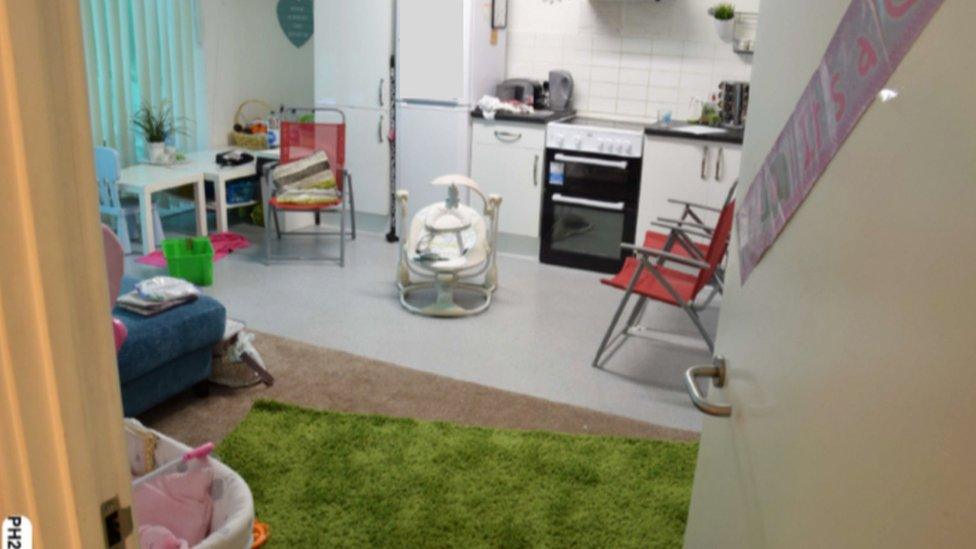
Inside the flat Butt shared with his wife and two children
Ms Rehman said for a time she and their son, born in 2014, were his sole focus - but he soon became intensely focused on the war in Syria.
His manager at KFC said they also noticed a marked change in his behaviour and appearance at work.
Butt began to shave his head and grew a beard. A colleague said around this time they had a discussion about the murder of soldier Lee Rigby and Butt told them it was "an eye for an eye".
His wife became aware that he was associating with hate preacher Anjem Choudary towards the end of 2014.
She said she warned him to "stay away from people like that" but told the inquest Butt was stubborn and would never do what people asked of him.
'A lion out of a cage'
Ms Rehman said her husband met Choudary at a dawah stall (a public display promoting Islam) in Stratford or nearby East Ham. After that initial meeting Butt would listen to Choudary's speeches on YouTube, and he hosted him at his home on at least one occasion.
A friend said Butt was "energised" in Choudary's company and described him as being "like a lion out of a cage".
Yet despite his new obsession with religion, Butt still dabbled in drug use and petty crime. His brother-in-law described him as "very impressionable".
In September 2015 another brother-in-law, Usman Darr, reported Butt to the anti-terrorist hotline after he defended the Islamic State group's execution of a Jordanian pilot who was burned to death in a cage.
Butt already had an "anger problem", Ms Rehman said. Soon, he began starting fights with other Muslims who he believed were not "true" followers of Islam.
Butt and his wife had a "massive" argument in late 2015 when he decided he wanted a second wife and she left him for a month.
It was at this time that The Jihadis Next Door aired on Channel 4. The documentary filmed a number of British extremists meeting across the country and included scenes showing Butt and others confronting police officers in London's Regent's Park.
Ms Rehman told the inquest she first became aware of the programme when she watched it at her parents' house. Butt hadn't told her anything about the programme or being filmed.
The inquest heard that between 2015 and 2017 Butt expressed strong anti-Western views, shared videos of beheadings on WhatsApp, and was expelled from a mosque.
He became increasingly angry, Saad told the inquest, over "foreign policy, the wars, the injustices overseas".
He said that after several disagreements Butt stopped talking to his family about Syria. They thought he had changed his way of thinking - but he was secretly plotting an attack similar to those in Manchester and Westminster Bridge.
"In that sense he lived a double life," his brother added.
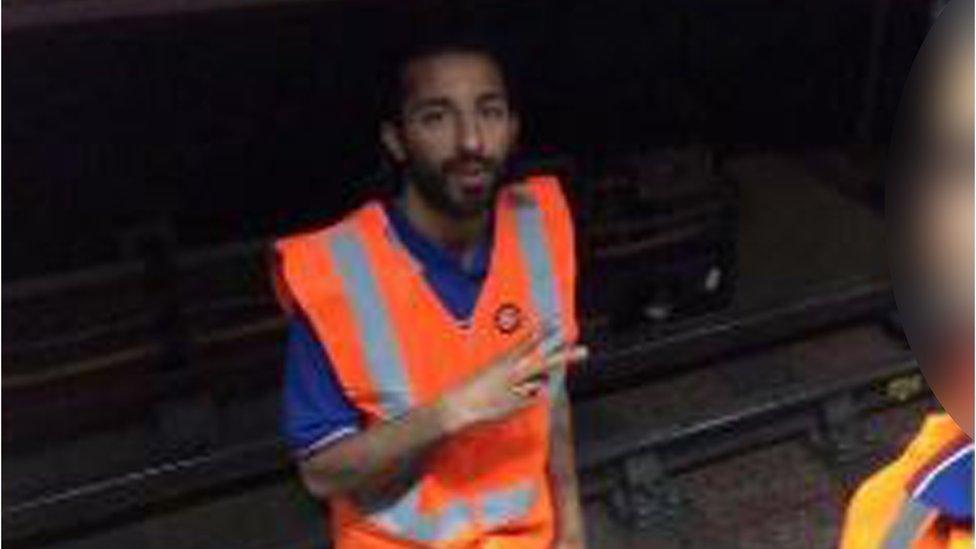
In May 2016, Butt began to work for London Underground as a customer service assistant
Just a couple of months later, Ms Rehman's family confiscated the couple's passports after Butt paid for flights to Turkey. She told her parents she suspected he wanted to take them and their infant son to Syria to join the Islamic State group and so her father destroyed the documents.
In May 2016, Butt began to work for London Underground as a customer service assistant.
His wife and family were delighted with his new job, but within weeks he started claiming sick pay after complaining his work-issued boots were damaging his feet.
His wife told the inquest: "It wasn't a genuine sickness - he just did not want to work."
Butt privately told his brother-in-law that he could not do the job because "in the summer there are too many naked women walking around".
His employers later terminated his contract after deciding he had failed his probation. It was around this time he began coming home smelling of cannabis again.
No kiss goodbye
His wife said Butt began to attend the Ummah Fitness Centre while he was on sick leave.
The gym was run by Sajeel Shahid and his partner, Sophie Rahman, who was the headteacher of the Ad-Deen Primary School in Ilford, a large commuter town to the east of London.
Butt was asked by the couple to teach the Koran to children at the school - despite his criminal cautions, his appearance on The Jihadis Next Door, his lack of references and background checks.
He began teaching a group of about six or seven children aged between seven and nine for two hours every afternoon. The school changed its name before closing in 2017, external.
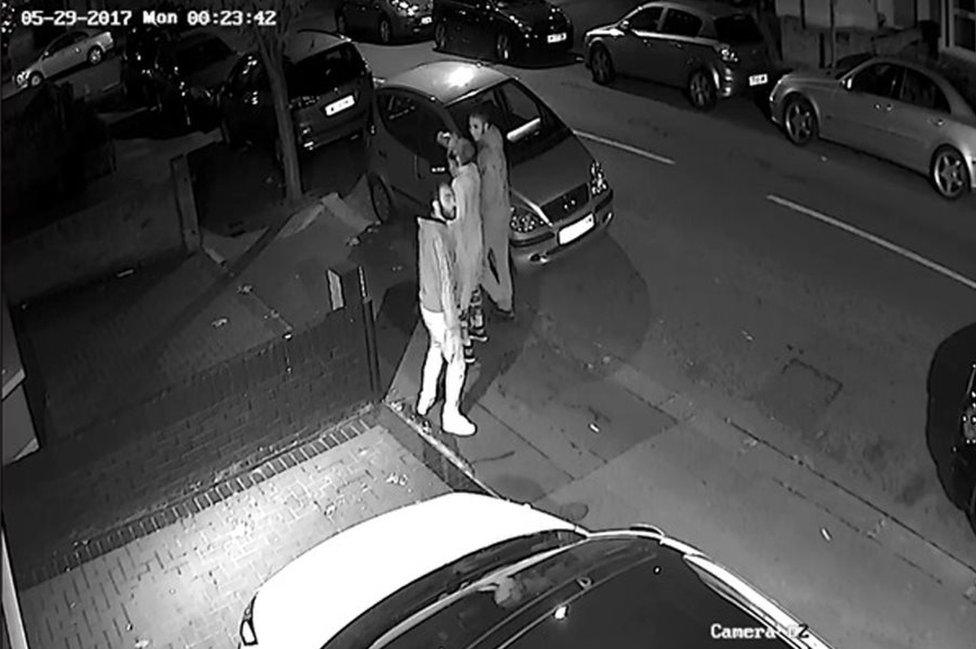
Rachid Redouane, Youssef Zaghba and Butt outside the Ummah Fitness Centre
In May 2017, just weeks before he launched his murderous attack, Butt and his wife had another child. By this point, his wife said, he simply wasn't interested in her or their growing family.
Just minutes after she had given birth to their daughter he announced he was leaving the hospital "to go the gym" - where, it later emerged, he was meeting his fellow London Bridge attackers.
Although Ms Rehman repeatedly asked him to spend more time at home with her and their children, her pleas fell on deaf ears.
On Saturday 3 June 2017, Butt left their home for the last time.
He left without kissing or saying goodbye to either of his children.
Eight people were killed that evening.
This account is told according to evidence given at the inquests into the deaths of the eight people killed, which began in May 2019.
- Published28 May 2019
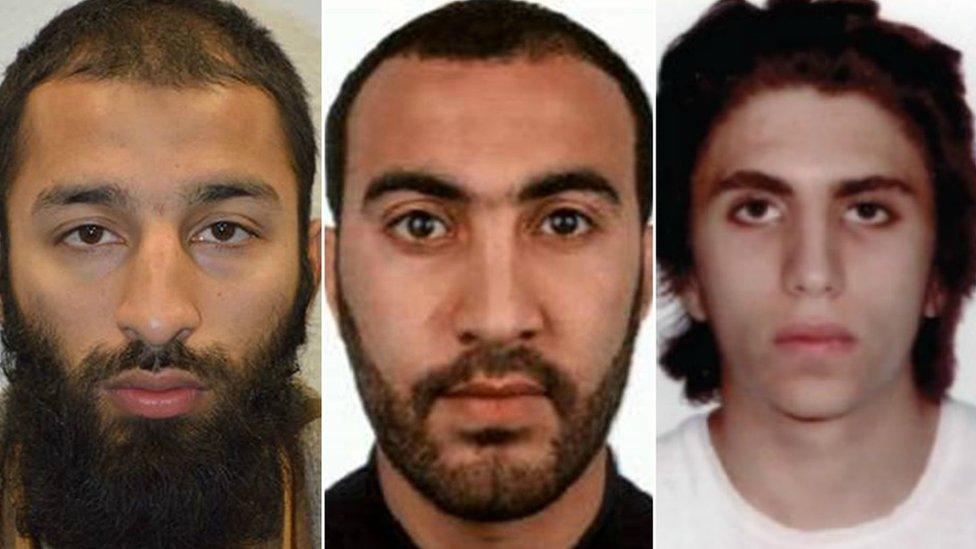
- Published4 June 2019
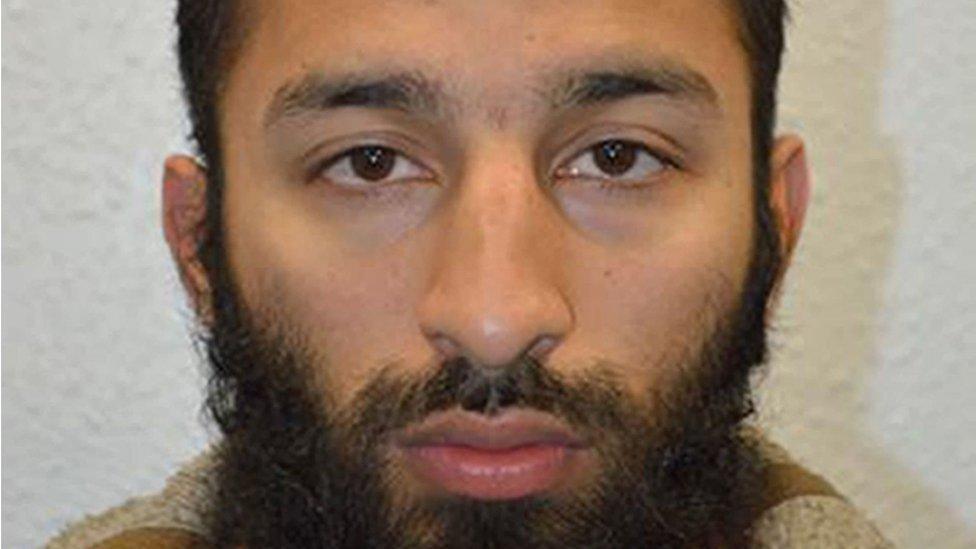
- Published7 June 2019

- Published6 June 2019
